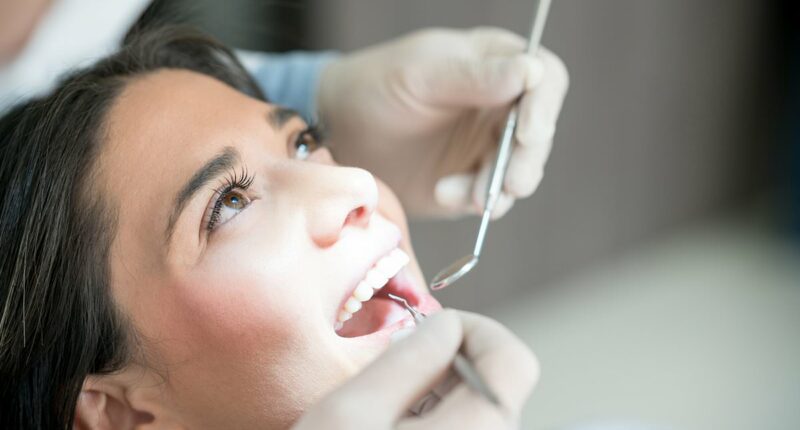Share this @internewscast.com
A trip to the dentist can reveal a lot more about your health than just how often you floss.
Routine cleanings and regular dental check ups are important as the mouth is considered the ‘gateway’ to the body, thus it can be the origin of problems in many different aspects of the body.
Research has also shown that more than 90 percent of all systemic diseases have some form of oral manifestation, meaning the condition may cause oral complications or present with oral signs or symptoms.
So, when you’re in the dentist’s chair, the doctor will check for cavities, but your mouth can also provide insight into your overall health, including if you have diabetes, cancer, heart disease or kidney disease and even HIV.
However, your mouth can also unknowingly reveal a lot about your lifestyle, and a dentist can see more than just disease.
Routine dental exams may divulge embarrassing habits or risqué activity that you would otherwise prefer to keep private.

Routine dental exams may divulge embarrassing habits and any recent risqué activity (stock image)
‘Dentists are the first line of defense in detecting system diseases and nutrition deficiencies because some of these diseases and deficiencies have oral manifestations,’ Dr Jarrett Manning, founder of JLM Dental Studio, told HuffPost.
‘This means the disease process may present as abnormal mouth lesions that dentists are trained to detect.’
While dentists check for gum health, tooth conditions and overall mouth hygiene, Manning emphasized that any dental checkups are also necessary because ‘any lesion, sore, or patch in the mouth can tell another story and give us insight to a deeper issue.’
Below, DailyMail.com outlines just some of what your mouth can reveal in the dentist’s office.
Childish habits and oral fixations
If you’re still partaking in the self-soothing habit of thumb sucking, you could be causing major damage to your teeth, and your dentist will be able to tell if you’re holding onto the childish practice.
Sucking your thumb, especially into adolescence and adulthood when permanent teeth come in, raises issues as it changes the structure of your jaw and growth of teeth.
Dr Erin Fraundorf, an orthodontist and founder of BOCA Orthodontic + Whitening Studio, told HuffPost: ‘Thumb-sucking may significantly alter not only a patient’s teeth but their jaws.
‘These signs include protruding upper front teeth with spacing, tucked back lower front teeth with crowding, a narrow upper jaw and an anterior open bite ― a lack of vertical overlap between the upper and lower front teeth.’
Dentists can also tell if you bite your nails or have an oral fixation that makes you bite or chew on things that should be left out of your mouth.
Dr Fraundorf added: ‘Without glancing at your nails, a dentist may be able to detect if you bite your nails ― or bite on other items, like pen caps or bottle caps.’
This is because the stress and wear and tear on your teeth from biting or chewing hard objects can cause chipping, cracking and wearing away of the enamel.
Bedroom activities
While you may prefer to keep your bedroom habits private, if you visit the dentist shortly after engaging in sexual activity, your doctor will be able to tell.
This is because performing oral sex on a person with a penis leads to distinct changes in the mouth, lasting for several days.
The giveaway is a rash of small red or purple marks at the back of the throat or the roof of the mouth, called palatal petechiae.
The marks are caused by bleeding beneath the oral tissue, similar to a bruise. While palatal petechiae can be triggered by a sickness or virus, in the case of oral sex, it’s caused by something repeatedly hitting the back of the mouth or throat.
This, combined with the pressure created if making a sucking action, which boosts blood flow in the mouth, increases the risk of marks appearing.
‘Sometimes we can tell,’ orthodontist Brad Podray said in a TikTok. ‘It’s usually bruising on the soft palate called petechiae. But unless the patient’s really young or shows signs of abuse, we don’t care.’
The revelation prompted hundreds of comments from followers, including one who wrote: ‘Oh my god, my dad is my dentist.’
Risky sexual behavior

Performing oral sex on a person with a penis leads to distinct changes in the mouth, lasting for several days, which your dentist will be able to see (stock image)
Some of the health conditions that cause oral symptoms include sexually transmitted diseases. So, your dentist may be able to tell if you’re engaging in risky or unprotected sexual behavior.
Because the symptoms of STDs vary, some may only present with oral signs and you may not realize you have the disease.
Herpes causes lesions and sores on and around the mouth and lips, while gonorrhea oral symptoms include swollen tonsils and white spots inside the mouth and throat.
The STD can also cause burning sensations and pain in the mouth and throat.
Syphilis can cause sores on the lips, tongue, gums, mouth and throat and hepatitis A and C can lead to altered taste and inflammation of the mucous membranes in the mouth.
Illicit indulgences
Drug users, whether those who occasionally indulge in party drugs or people with addictions, may unwillingly reveal their secret to their dentists.
Cocaine can cause perforation of the palate, according to a study in the journal Nature, as well as lesions and the erosion of the tooth surfaces.
The drug also makes you more prone to periodontal diseases, or those of the gum and oral tissues.
Additionally, people who use meth may experience ‘meth mouth,’ which causes tooth decay and gum disease and can lead to teeth cracking and falling out.
Hidden diseases
While it may seem unexpected, dentists may be the doctors that actually reveal major health complications that go far beyond your mouth.
‘You can see if someone has HIV by identifying specific lesions called Kaposi’s sarcoma that are common in uncontrolled HIV cases and have a distinct visual appearance,’ Dr Ilona Casellini, founder of Swiss Quality Smile, told HuffPost.
Karposi’s sarcoma appears as lesions on gums, the mucous membranes and the roof of the mouth.
People with HIV may also experience chronic dry mouth, canker sores and hairy leukoplakia, which presents as white patches on the tongue, that dentists can pick up on.
‘Oral yeast infections can be a symptom of HIV in young patients who seem to otherwise present as healthy,’ Fraundorf added.













